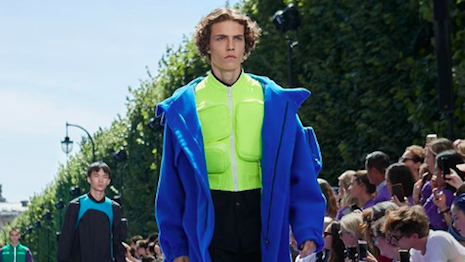- About
- Subscribe Now
- New York,
August 5, 2019

 Virgil Abloh's debut menswear show for Louis Vuitton. Image credit: Louis Vuitton
Virgil Abloh's debut menswear show for Louis Vuitton. Image credit: Louis Vuitton
The rise of streetwear has blurred the lines between luxury and leisurewear, but the casualization of luxury may not thrive in the long-term, according to a new report from Fashionbi.
Luxury labels including Balenciaga and Louis Vuitton have found success by diving into streetwear, while other brands have borrowed marketing and sales tactics such as social media drops. Expectations for streetwear remain high as luxury groups continue to invest millions of dollars into the trend.
“In past years we saw many collaborations between mass-market and premium brands, but now the trend switched towards the collaborations between the premium and mass-market brands with the street style brands,”said Yana Bushmeleva, chief operating officer at Fashionbi, Milan. “The competition is growing since many celebrities who used to be the faces of such collections started their own brands.”
Streetwear strength
Streetwear’s popularity is propelled by millennial and Generation Z affluents.
According to Fashionbi’s “Streetwear in 2019: Rise or Fall?” report, the market is currently estimated to be worth $20 million and is expected to be valued at $25 million by 2025.
#FendiMania is a logo-centric collection. Image credit: Fendi
Breakout brands in streetwear include Off-White and Supreme, both of which have collaborated with luxury brands such as Rimowa and Jimmy Choo. Virgil Abloh, the founder of Off-White, began his career at Fendi and is now artistic director for Louis Vuitton menswear.
Limited releases of capsule collections or speciality products, known as drops, are central to streetwear. These exclusive products are often resold on the secondary market at higher price points, driving more interest as distribution remains limited.
Italian fashion label Fendi made a move into streetwear-style retail with a limited drop of merchandise.
The #FendiMania collection featured the Fila-style Fendi logo, blending the luxury brand’s aesthetic and sportswear influences. Translating exclusivity and access to 21st century retail, drops allow brands’ inner circles to feel like one of a few (see story).
High-end brands and retailers have also been turning to collaborations and acquisitions to capitalize on the strength of streetwear.
In 2018, online retailer Farfetch expanded its offerings in upscale sneakers and streetwear with the acquisition of marketplace Stadium Goods. Retailing both new and deadstock merchandise, Stadium Goods sells brands ranging from Supreme to Louis Vuitton (see story).
Additionally, Balenciaga, Christian Louboutin and Louis Vuitton have all released their own sneaker lines.
Fenty sells ready-to-wear apparel and accessories. Image credit: Fenty
Earlier this year, conglomerate LVMH Moët Hennessy Louis Vuitton tapped singer Robyn Rihanna Fenty to create a new luxury house.
Taking cues from streetwear culture, LVMH and Rihanna are releasing Fenty collections on a “see-now wear-now” strategy (see story). Fenty has also focused on experiential retail with pop-ups in Paris and New York (see story).
Streetwear slipping?
As luxury streetwear becomes more mainstream, there are some indications that there may be a slowdown.
While drops and collaborations remain popular, few attract the highest levels of frenzy.
Fashion retailer Mytheresa is expanding beyond its core focus by introducing menswear. But could its specific focus on a more tailored experience allude to the fall of streetwear’s popularity?
Mytheresa Menswear will launch in January 2020, rounding out its women’s wear and children’s wear offerings. Instead of fully embracing luxury casual wear in the same vein as other retailers, Mytheresa will be catering to an ultra-luxury audience, despite streetwear’s exceptional popularity (see story).
Meanwhile Gucci, Balenciaga, Valentino and Prada are some of the most sought-after brands this season, as the popularity of their luxury streetwear and logo-focused handbags are pushing them forward.
According to the Lyst Index for the second quarter of 2019, Gucci held the top spot as the hottest brand following a 20 percent increase in revenue growth. Balenciaga ranked at number three, behind Off-White, as it unveiled its Track 2 sneakers while also pledging to offer full four-year scholarships to the Pratt Institute Black Alumni (see story).
“We will still witness the growth in sales of the street style products online and offline,” Ms. Bushmeleva said. “However, the brands need to go beyond ‘classic’ hoodies and T-shirts in order to keep the same speed of growth.”
Share your thoughts. Click here